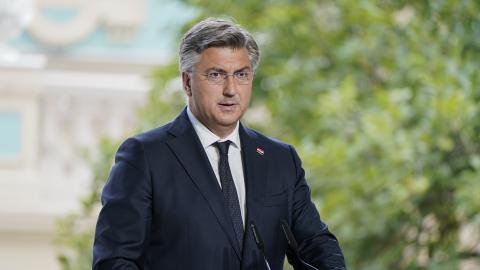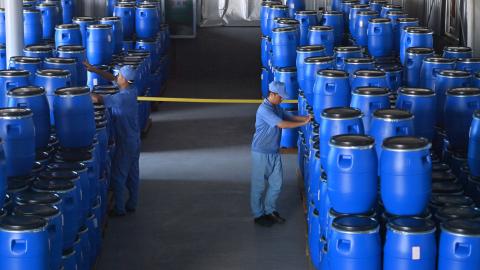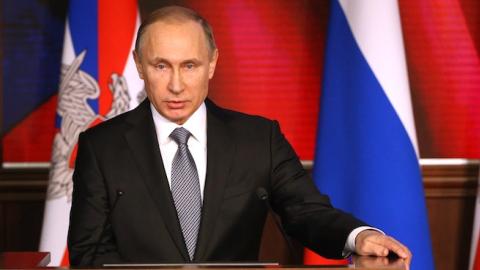On August 1, 1991, following a cordial meeting with Mikhail Gorbachev in Moscow, US President George H. W. Bush arrived in Kyiv to deliver what later became known as the Chicken Kiev Speech to the Supreme Soviet of the Ukrainian Soviet Socialist Republic. Bush warned Ukrainian legislators (most of them Communists) of the perils of suicidal nationalism and preached the benefits Ukraine would reap in a revamped Soviet Union, led by Nobel Peace Prize Laureate Mikhail Gorbachev. Ukrainian comrades were reluctant to heed the presidential appeal; and by the end of August, the same Supreme Soviet declared the independence of Ukraine, which was later confirmed by a massive “yes” vote in a national referendum throughout all the regions of Ukraine, including Crimea.
The potential collapse of the USSR was a major concern for the US Administration, mostly due to the uncertain future of the Soviet nuclear arsenal. When just several months after the Chicken Kiev Speech this collapse became a reality—to the US State Department’s utmost surprise—the US expended enormous effort securing the transfer of all of the nuclear weapons deployed in Ukraine, Belarus, and Kazakhstan to the Russian Federation as the legal successor state to the USSR. The crowning achievement of these efforts was the Budapest Memorandum of 1994, under which the Russian Federation, the United States, and Great Britain provided security assurances for the sovereignty and territorial integrity of Ukraine, which in exchange gave up its nuclear weapons. The true value of this memorandum was revealed in February 2014.
A quarter-century after these dramatic events, the world again faces the decline and potential collapse of another avatar of the Russian state. It took three plus centuries for the Romanov Empire to fail, and it took about seventy plus years to prove the totalitarian idea behind the USSR to be a failure as well. Why is it that such a young post-Communist incarnation of the Russian polity is turning into a failed state, as we speak? I believe that the key reason was the genesis of this model, its fatal birth defect. From 1989 to 1991, the Central European and Baltic nations experienced both democratic and national revolutions at the same time. The positive energy resulting from these developments produced successful state and national projects. In contrast, with the benefit of 20/20 hindsight, it has become painfully obvious that the USSR’s policy of perestroika had a clear agenda: The Communist Party and the KGB nomenklatura would seek to convert its collective and total political power into huge private fortunes for members of the nomenklatura.
They did so by tailoring the mafia state to their needs, which was deprived of any market-economy institutions, and, most important, of private property as its foundation. In Russia an “owner” succeeds by exploiting through proximity to, or direct association with, the authorities who control administrative resources (e.g. over a small or not very small segment of the state), and through complete loyalty to the ruling mafia and its honchos, rather than through efficient management and competition.
Criminal Putinomics is incapable of overcoming the addiction to oil money, and even with sky-high oil/gas prices, it would only stagnate for a long period. Any kind of successful development, business initiative, or innovation is totally unthinkable under Putin’s kleptocracy.
Until quite recently, the Putin regime was able to fulfill its simple duties under the social contract with its subjects. The Kremlin provided a passable (by Russian historical standards) standard of living for a large segment of the population: A once-a-year vacation in Turkey and a used car of foreign make. In exchange, the populace would allow the leadership to steal billions and ride the gravy train for ever and ever.
However, the war with Ukraine and worsening relations with the West triggered the inevitable collapse of Russia’s economic Potemkin Village and exposed a primitive obschak (the common loot fund of a criminal community in the Gulag). The gangland honchos thus failed to extend their 15-year-old contract with society.
Each additional day that the delusional dictator and his gang stay in office exacerbates the Russian crisis, makes an exit more challenging, and becomes hazardous even for the privileged few. This applies especially to regional elites and, particularly, to regional-ethnic elites, who have begun to ponder their future positions in a post-Putin Russia.
The regions have begun losing faith in the federal government’s ability to prevent economic crisis. At the same time, by taking resources away from the regions via taxation policy, while keeping regional leaders in charge of social policies, Moscow has left them alone to face the rapid slide of their populations into poverty.
In these circumstances, the territorial breakup of the Russian Federation is highly likely, as happened in 1917 and 1991. If Putin does not leave voluntarily (or with a little help from his friends) in 2016, by 2017 (the year of the centennial anniversary of the Russian Communist Revolution), Russia in its current incarnation will be gone. The most significant consequence of this tectonic split with respect to 21st-century world history will be the destiny of Siberia.
For the past 10–15 years, I have been preaching in vain to the Russian political class, trying to warn that
…confrontation with the West and the development of a “strategic partnership” with China will leave Russia not only marginalized but also subject to China's strategic interests. And this will lead in the end to the loss of control over the Russian Far East and Siberia, first de facto and then de jure. The Holy Aesopean Alliance of Emperors Pu and Hu is the alliance of a rabbit and a boa constrictor. Its outcome is inevitable, and it will be swift. We've been so desperate to hold together the tatters of our own “near abroad” that we failed to notice that we have now become part of China's “near abroad.”1
From 2009 to 2015, Russia entered into a number of bondage economic agreements with China, concerning, for example, energy supplies and joint development of mineral deposits. These ventures will be used in China to set up production of iron, copper, molybdenum, gold, antimony, titanium, vanadium, germanium, tin, etc. China will build processing facilities on Russian soil, where Chinese workers will be employed.
These agreements follow the pattern of relations that China has entered into with a number of African dictators in the past decade, though in the case of Africa, they provided for a significantly larger degree of employment for local people.
China has everything it needs: A license to digest a strategic region for a while—which so far remains outside its physical borders—plus regular energy supplies from the country China plans to digest. By the time this license expires, China would not need to renew it anymore. As Chinese military stratagem states: "An efficient control over a lengthy period of time will eventually shift geographic borders."
China is so satisfied with the current development of Sino-Russian relations and so confident that from now on the game is going to be played by Chinese rules, that in May 2014, Chinese Vice-President Li Yuanchao, speaking at the round table “Russia-China: strategic economic partnership,” in the presence of the highest-ranking Russian officials, made a statement of unprecedented daring and frankness to the point of bordering on insult:
Our businessmen say that Russia has vast territories, while China has the most hardworking people in the world. If we can combine these factors, we’ll get a significant economic boost. Russia has a large territory and few people, while China is in exactly opposite situation.2
The last time a similar suggestion was made was in December 1949, by Mao Zedong, when he came to Moscow to sign the Sino-Soviet Treaty of Friendship, Alliance and Mutual Assistance. For some reason, Comrade Stalin disliked it so much so that Mao spent the next two months in Moscow under de facto house arrest. It seems that 65 years later, the Chinese leadership has decided that the northern barbarians are finally ready to accept it.
As Aleksandr Lukianov, a Siberian analyst, put it forth, one of the reasons for the key choices made by the Kremlin regarding Siberia
…could be motivated by the Russian leadership’s intention to secure additional assurances for its preservation of power. The Chinese are perfectly aware that in case of [a] change of government in Russia, any new leadership, which would replace the current one, be it liberal, communist, nationalist, red, green, or sky-blue pink, would immediately revise the conditions of “cooperation,” which is so beneficial for China, but rather harmful to Russia’s national interests. As a result China turns into a stakeholder directly involved in keeping the power in Russia in the hands of those people who generously acceded to yield resources of Siberia and [the] Russian Far East to China. 3
China is quite happy with the current pace of consistent economic and demographic takeover of Siberia and the Russian Far East condoned by Russian rulers. As a Putinistan colony, Siberia is doomed to fall into China’s lap like a ripe (or, rather, rotten) fruit. Only a politically and economically independent Siberia would be able to preserve its Russian (and therefore European) identity.
If the Russian Federation begins to disintegrate, the Republic of Siberia would be one of the first to be proclaimed independent. The entire Beijing strategy, having been designed for decades, would be questioned, and in response Beijing would accelerate its takeover of Siberia and the Russian Far East. China could apply a number of political tactics in the face of total collapse of the Russian central government. It could, for example, employ a “Yanukovych scenario,” as follows:
One day, before Putin completely loses his official authority, Chinese commandos would evacuate him to Beijing, where he would be declared the legitimate President of Russia. In this capacity, he would sign any required letters and petitions to the Chinese government, and agreements with it. One of them, for instance, could be a “Request for the historical unification of the PRC [People’s Republic of China” and the RF [Russian Federation] in the family of nations—spiritual heirs of Genghis Khan’s Great Empire.”
I did not make up this language. It is taken from the writings of a former Soviet military intelligence (GRU) officer and renowned sinologist, Colonel Andrei Devyatov. His pro-China lobbyist group “Heavenly Politics” promotes the idea of restoring the New Horde, which would oppose the soulless West.
China might also use the school of thought quite familiar from the annexation of Crimea: protection of fellow Chinese nationals in Siberia, and the polite little green men would be ready to provide them with humanitarian assistance.
Beijing’s practical goals would be to:
# Return to the PRC territories marked in Chinese school history text books as annexed by Tsarist Russia under unfair treaties of 1858 and 1860.
# Incorporate the rest of Siberia as Jochi Ulus (a.k.a. the Golden Horde) into a sort of union of states-heirs similar to Genghis Khan’s Great Empire. (The first leader of the reborn Jochi Ulus could be the above-mentioned, perfectly ideologically motivated “heavenly politician,” Colonel Devyatov.)
If implemented, this program would result in total de-Russification of the lands east of Urals in one to two generations.
For any Russian, apart from “heavenly politician” sinologists who went nuts about Westernphobia, the absorption of Russian Siberia into the Han sea, would be an irreversible tragedy. It would be also my personal tragedy, especially since all of my ancestors from my mother's line were Siberians, some of whom came to Moscow in November 1941 to take part and perish in a major battle of World War II.
But this would not be just a Russian issue. For humanity in general, the Chinese takeover of Siberia would be a quantum leap, which would change the geopolitical structure of the world forever. A new nation resembling Genghis Khan’s empire would emerge on the Eurasian continent. Central Asia would end up in its sphere of domination. Japan, Korea, and the rest of China’s neighbors (which have dozens of territorial disputes with China) would be extremely threatened by China’s boost.
And what about the world’s cop? Well, he is on vacation, at least till January 20, 2017. President Barack Obama would express serious concern. He would dispatch his Secretary of State to negotiate with Chinese President Xi and the Jochi Ulus Ruler Devyatov, immediately transferring all nuclear weapons deployed in Jochi Ulus to the People’s Liberation Army of the PRC. This step is required by the inviolable principles of the Treaty on the Non-Proliferation of Nuclear Weapons. It is also in the spirit of President Obama’s noble plan of moving toward global nuclear zero. The second US priority would be Jochi Ulus’s swift accession to the Paris Protocol Against Global Warming.
Secretary Kerry would enthusiastically embrace this historic mission, hoping that combined with his Iranian and Syrian diplomatic achievements, it would finally grant him his long-awaited Nobel Peace Prize. In the beginning, he might miss his traditional partner, Sergei Lavrov. Lavrov will have been summoned urgently to The Hague for a pressing issue. Soon enough, Secretary Kerry will have recomposed himself by finding a new Alpha male: Chinese Foreign Minister Wang Yi.
Actually, I doubt that events would develop so rapidly, and most likely not under the current Administration, but a new Administration in Washington will face the challenge of a century.
If China succeeds with a Siberian Anschluss, the world will never be the same. From then on, it will play by China’s rules. Nobody wants it to happen, but who will be able to resist such a fate? Nobody but the people of the Republic of Siberia and one more person: the 45th President of the United States.
The US is the only global power with the political, economic, and military resources to convince China to refrain from this breathtaking temptation. Most likely there will be no need to seek recourse in the last argument: military force. For China, it is very important to preserve its economic symbiosis with the US, much more so than for the latter. However, one should not rule out the risk of military escalation. Never before have the stakes been so high, both for the world and for the US, and the decision to be made falls to the US President.
Eight centuries ago, in 1206 and 1215 (by historical standards almost at the same time), in two places very distant from each other on earth, two political bibles were composed: the Great Yassa of Genghis Khan and the Magna Carta. The choice between an independent, ethnically European Russian Republic of Siberia and a reborn Mongol Empire may again be the choice for the entire world order in the 21st century: the Magna Carta or the Great Yassa. This choice will to a great extent depend on decisions made in Washington, DC.
Meanwhile, the rest of the world has nothing else to do but study carefully the faces of the candidates for the 45th President of the United States.

















